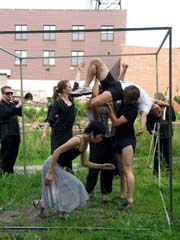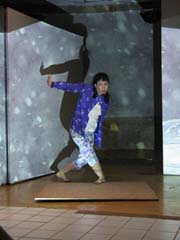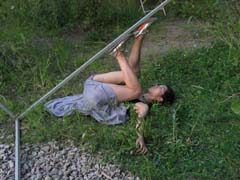
Jack Anderson
"Sundown" on the Gowanus Canal
"Sundown"
Yoshiko Chuma and the School of Hard Knocks
July 29-30, 2006, 3-10 p.m.
Issue Project Room, 400 Carroll Street, Brooklyn
Info: (718) 330-0313 or www.issueprojectroom.org
Reviewed by Jack Anderson July 31, 2006
 |
| "Sundown" on the Gowanus Canal by Yoshiko Chuma and the School of Hard Knocks. Photo by Jonathan Slaff. |
Yoshiko Chuma's "Sundown" celebrated urban gawking. It also suggested that seven is Chuma's lucky number, for this seven-hour event (3-10 p.m.) presented in the year's seventh month involved seven dancers under Chuma's direction, seven trombonists playing a score by Christopher McIntyre, and a set of seven-foot cubes designed by Ralph Lee.The site-specific production involved more than numerology. It took place in and around an arts center called the Issue Project Room, a silo-like structure beside the Gowanus Canal. The locale itself became as striking as the action Chuma created there with dancers from her School of Hard Knocks: Ursula Eagly, Steven Reker, Saori Tsukuda, Christopher Williams, Ryuji Yamaguchi, and Jean Butler.
You didn't need to spend seven hours to enjoy "Sundown," and spectators were free to come and go at will. Arriving in late afternoon, I didn't even see sundown at "Sundown." But what I did see kept me watching with pleasure.
"Sundown" proclaimed that all cities are theaters and that all activities in them might be regarded as dances. The Issue Project Room sits in a rather unkempt lot filled with stones and tangles of weeds. The canal is to its left and, looking across the water, you behold what might be warehouses, small factories, and low office buildings which, against the blue skies of a sunny Sunday afternoon, had the clean lines of paintings by the American Precisionist painters of the 1930's who savored the aesthetic appeal of industrial structures.
Chuma let her audience wander at will through this setting. So here are a few notes about my own wanderings. Shortly after I arrived, an attendant announced that things were happening on the second-floor inside the silo. So, while a trombone wailed from a balcony, up a metal exterior staircase I went, opened a door, and found myself in the midst of mixed media.
 |
| "Sundown" by Yoshiko Chuma and The School of Hard Knocks at Issue Project Room. Pictured: Yoshiko Chuma. Photo by Jonathan Slaff |
"Sundown" involved more than trombone music. It also had what the program called a "sound design" created by Jacob Burckhardt in collaboration with Stephan Moore: an agitated one at this point in the proceedings, for it was dominated by what sounded like airplane noises while the space's back wall filled with video images of trees and rubble-strewn landscapes. A male dancer darted warily through the room, then scrambled from side to side as if being pursued (by those airplanes, perhaps?). Other dancers shifted panels about that could serve as the walls of cube-shaped rooms. Then curiosity led me to wonder what was happening outside.
I discovered Chuma herself running in and out of a cube without solid walls, sometimes tilting the object this way and that. But something new appeared to be going on back inside. Now it was as if I had stumbled upon a folklore festival in an obscure Balkan nation. There were heavy rhythmic stampings to vehement music. Processions of dancers emerged from a trapdoor, crossed the space, and descended the exterior stairway. Some tottered, slapping their chests or holding their hands and arms in stiff paw-like positions. Others carried unexpected objects: metronomes, stopped clocks, a green branch held like a dowsing rod, and a pitcher filled with what at first glance seemed limes. But, on closer inspection, they proved to be green tennis balls which the dancers bounced.
Back outside, trombonists had gathered near two cubes, one of which Chuma continued to tilt. And she was joined by other dancers. To my left, I beheld downtown Brooklyn with its skyscraper long known as a hive of dentists' offices. Suddenly, all about me had become a theatrical event. Pedestrians gaped at the dancers from the Carroll Street bridge and a truck carrying what appeared to be rolls of cable wire paused so that its driver could see what was happening.
 |
| "Sundown" by Yoshiko Chuma and The School of Hard Knocks at Issue Project Room. Pictured: Saori Tsukuda. Photo by Jonathan Slaff. |
Things continued happening indoors upstairs. Videos flickering on walls and panels showed more trees, as well as sand, pyramidal structures, urban streets, and construction (or were they demolition?) sites. Dancers kept emerging from the trapdoor. But sometimes its cover suddenly snapped shut, leaving dancers caught inside frantically banging on it in a desire to escape. Shadows of dancers in the room melted into the video scenes on the panels, and a new world was born when someone raised a window shade, unveiling the sunshine and greenery outside and thereby flooding a corner of the dim interior space with real-life Technicolor. When trombonists in the room exited, I followed them.
Outside, dancers were again tilting cubes. Some spectators on the canal bank quietly contemplated the water. I stared at a red building with ERA painted on it in white letters and at a wall covered with cartoons of fish and other sea creatures, then sat in one of the chairs scattered throughout the yard and started taking notes. When I looked up again, all the dancers and spectators had moved elsewhere. Yet lots of things were going on. People were still strolling down Carroll Street. Traffic kept flowing.
And I decided it was time to leave. Press releases suggested
that an hour was sufficient time to sample "Sundown." To my
surprise, I discovered I'd been there for two hours. The production was
addictive. Something was always happening in it, and I knew that something
would continue happening when I went off somewhere else. So, feeling content,
I left this theatrical realm and re-entered the theater of New York City.
| museums | NYTW mail | recordings | coupons | publications | classified |
